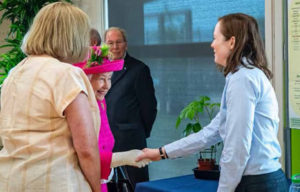Message from the director

funded Cowpea research project
At THRiVE Secretariat we believe in changing the world. We share that vision with our fellows, alumni, researchers, partners and stakeholders. We welcome them to share ideas on how they challenge the status quo by applying new or adapted ground-breaking ideas to improve health and well-being of people in need. We are, however, keenly aware of the pressures among researchers and fellows to demonstrate research leadership and excellence to remain competitive in securing grants, publishing papers and have an impact on policy and practice.
The coalition of research funders and charitable foundations (cOAlition S) is pushing to make full and immediate open access to research publications a reality; thus, ensuring that the results from publicly-funded research are published in Open Access Journals, on Open Access Platforms, or made immediately available through Open Access Repositories without embargo.
The potential impact of these changes on researchers is enormous and may compound other existing challenges. In his article in Nature 557(7705):294-296 (2018) “Some hard numbers on science’s leadership problems” Van Noorden, Richard summarised findings from a European and US survey. A key message was that principal investigators who run labs
have a much rosier picture of the dynamics in their research groups than do many people in those groups including post docs and PhD trainees.
It seems senior and junior researchers belonging to the same research group may be living in separate worlds because of ineffective communication. Lack of training in research/lab and personnel management contributed greatly to an unhealthy lab culture. This may be true in other types of research. A stellar researcher is not necessarily a good manager of a research team. If we are to change the world, we should ensure we train researchers in research management including managing research resources and people.
